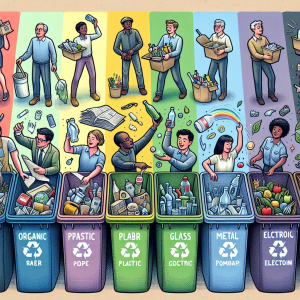Green Alternatives: Must-Have Eco-Friendly Products
In today’s rapidly changing world, the transition to green alternatives is not just a preference but a necessity. The rise of eco-consciousness signifies a growing awareness among consumers about the impacts of their choices. Opting for eco-friendly products is now a powerful way to contribute to environmental conservation, and selecting the right products can maximize their positive impact.
- Reusable Shopping Bags: Unlike single-use plastic bags that contribute significantly to pollution, reusable shopping bags are durable, easy to clean, and often made from recycled or upcycled materials. They decrease overall plastic waste and encourage sustainable living practices. Look for bags made from sturdy materials like organic cotton, hemp, or recycled plastic fibers to ensure longevity and minimize resource consumption.
- Biodegradable Cleaning Products: Many conventional cleaning products contain chemicals detrimental to both the environment and human health. Eco-friendly cleaning products utilize natural ingredients such as vinegar, baking soda, and essential oils. These alternatives not only provide effective cleaning but also degrade more swiftly and safely, reducing toxic run-off into water systems and preserving ecological balance.
- Solar-Powered Gadgets: Harnessing solar energy can significantly cut back on electricity consumption from non-renewable sources. Solar-powered chargers, lanterns, and garden lights offer sustainable alternatives to their battery-powered counterparts. Investing in solar technology promotes energy independence and leads to long-term savings, while actively participating in reducing greenhouse gas emissions.
- Bamboo Products: Bamboo is a fast-growing, renewable resource that requires minimal water and no pesticides to flourish. Transitioning to bamboo-based products such as toothbrushes, kitchen utensils, and textiles reduces deforestation and the use of synthetic materials. Additionally, bamboo’s biodegradability ensures that products contribute minimally to landfill waste at the end of their life cycle.
- LED Light Bulbs: Switching to LED light bulbs is an energy-efficient way to reduce carbon footprints. LEDs consume significantly less electricity than traditional incandescent bulbs and have a longer lifespan, decreasing the frequency of replacements and subsequent waste. They contribute to substantial energy savings over time, leading to cost-efficient household energy management.
- Organic Personal Care Products: Many personal care items contain microplastics and synthetic compounds harmful to both health and the environment. Organic alternatives avoid these components and emphasize natural, sustainably sourced ingredients. This reduction of chemical use contributes to healthier ecosystems and promotes biodiversity, while often being packaged in minimal, recyclable materials.
- Compostable Tableware: By replacing traditional plastic or Styrofoam options, compostable plates, cups, and cutlery made from materials like cornstarch and sugarcane bagasse break down quickly and reduce landfill load. These products are ideal for events and can handle both hot and cold foods effectively, making them versatile additions to an eco-friendly lifestyle.
- Sustainable Apparel: The fashion industry is notorious for its environmental impact, but sustainable clothing companies are revolutionizing the sector. Brands focusing on organic cotton, recycled fibers, and ethical labor practices provide wardrobe options that lessen environmental degradation. They advocate for conscious consumerism, urging buyers to consider the lifespan and production process of their garments.
- Water-Saving Devices: Incorporating water-saving fixtures like low-flow showerheads and dual-flush toilets can significantly reduce water usage. These devices are designed to maintain performance while minimizing waste, thus supporting water conservation efforts. Efficient water management is crucial in combating droughts and preserving essential water resources for future generations.
- Recycled Paper Products: Paper production remains a major contributor to deforestation and energy use. Opting for recycled paper products—such as notebooks, printer paper, and tissues—helps reduce the demand for virgin materials. The process of recycling paper consumes less energy and water, and it minimizes waste, supporting sustainable forestry initiatives globally.
- Electric or Hybrid Vehicles: For those seeking to make more substantial lifestyle changes, switching to an electric or hybrid vehicle can vastly decrease carbon emissions from daily travel. These vehicles produce lower emissions compared to traditional gasoline cars and often qualify for government incentives, making them an attractive proposition for eco-conscious consumers.
- Plant-Based Diets: Adjusting dietary habits to reduce meat and animal product consumption can significantly reduce personal carbon footprints. Plant-based diets ease stress on agricultural systems and lower greenhouse gas emissions associated with livestock. Additionally, they often promote better overall health, merging personal well-being with environmental responsibility.
Incorporating these eco-friendly products into everyday life not only supports a healthier planet but also fosters a mindset centered around sustainability and responsibility. Each small change contributes to a larger shift toward preserving our environment for future generations, highlighting the profound impact of conscious consumer habits.



